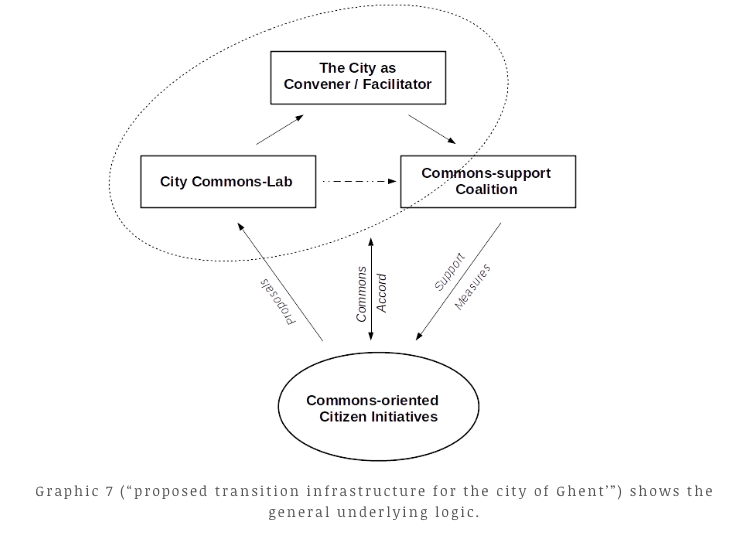Authors: Michel Bauwens and Yurek Onzia
Date published: June 2017
Research commissioned by: The City of Ghent
Why did we select this research?
This research was commissioned by the City of Ghent to investigate the possibility of a potentially new political, facilitative and regulatory relationship between the local government of Ghent and its citizens, moving away from a ‘command and control’ approach, towards a ‘partner city' approach. The commons is a way to describe shared, material or immaterial property that is stewarded, protected or produced by a community – in an urban context often by citizens’ collectives – and managed according to the rules and standards of that community. It is distinct from state bodies – government, city, state – but also from market actors. The commons is independent of, but of course still holds relationships to, the government and the market. Examples include shared work spaces or set-up energy cooperatives. This Commons Transition Plan for Ghent can be an inspiration for- and applied to other cities as well.
Key findings
The proposal includes a public-partnership based processes and protocols to streamline cooperation between the city and the commoners in every field of human provisioning.

Commons initiatives can forward their proposals and need for support to a City Lab, which prepares a ‘Commons Accord’ between the city and the commons initiative, modeled after the Bologna Regulation for the Care and Regeneration of the Urban Commons. Based on this contract, the city sets-up specific support alliances which combine the commoners and civil society organisations, the city itself, and the generative private sector, in order to organise support flows.
Recommendations for the Ghent's city government
(as in an executive summary by Michel Bauwens (P2P Foundation, research) and Yurek Onzia (project coordination).
- The creation of a juridical assistance service consisting of at least one representative of the city and one of the commoners, in order to systematically unlock the potential for commons expansion, by finding solutions for regulatory hurdles.
- The creation of an incubator for a commons-based collaborative economy, which specifically deals with the challenges of generative start-ups.
- The creation of an investment vehicle, the bank of the commons, which could be a city bank based on public-social governance models.
- Augmenting the capacity of temporary land and buildings, towards more permanent solutions to solve the land and housing crisis affecting commoners and citizens.
- Support of platform cooperatives as an alternative to the more extractive forms of the sharing economy.
- Assisting the development of mutualized commons infrastructures (‘protocol cooperativism’), through inter-city cooperation (avoiding the development of 40 Uber alternative in as many cities).
- Make Ghent ‘the place to be’ for commoners by using ‘Ghent, City of the Commons’ as an open brand, to support the coming of visitors for commons-conferences etc.
- As pioneered by the NEST project of temporary use of the old library, use more ‘calls for commons’, instead of competitive contests between individual institutions. Calls for the commons would reward the coalition that creates the best complementary solution between multiple partners and open sources its knowledge commons to support the widest possible participation.
Reference
M, Bauwens and Y, Onzia. (2017). Commons. Transition Plan for the city of Ghent. Retrieved from: https://stad.gent/sites/default/files/page/documents/Commons%20Transition%20Plan%20-%20under%20revision.pdf
